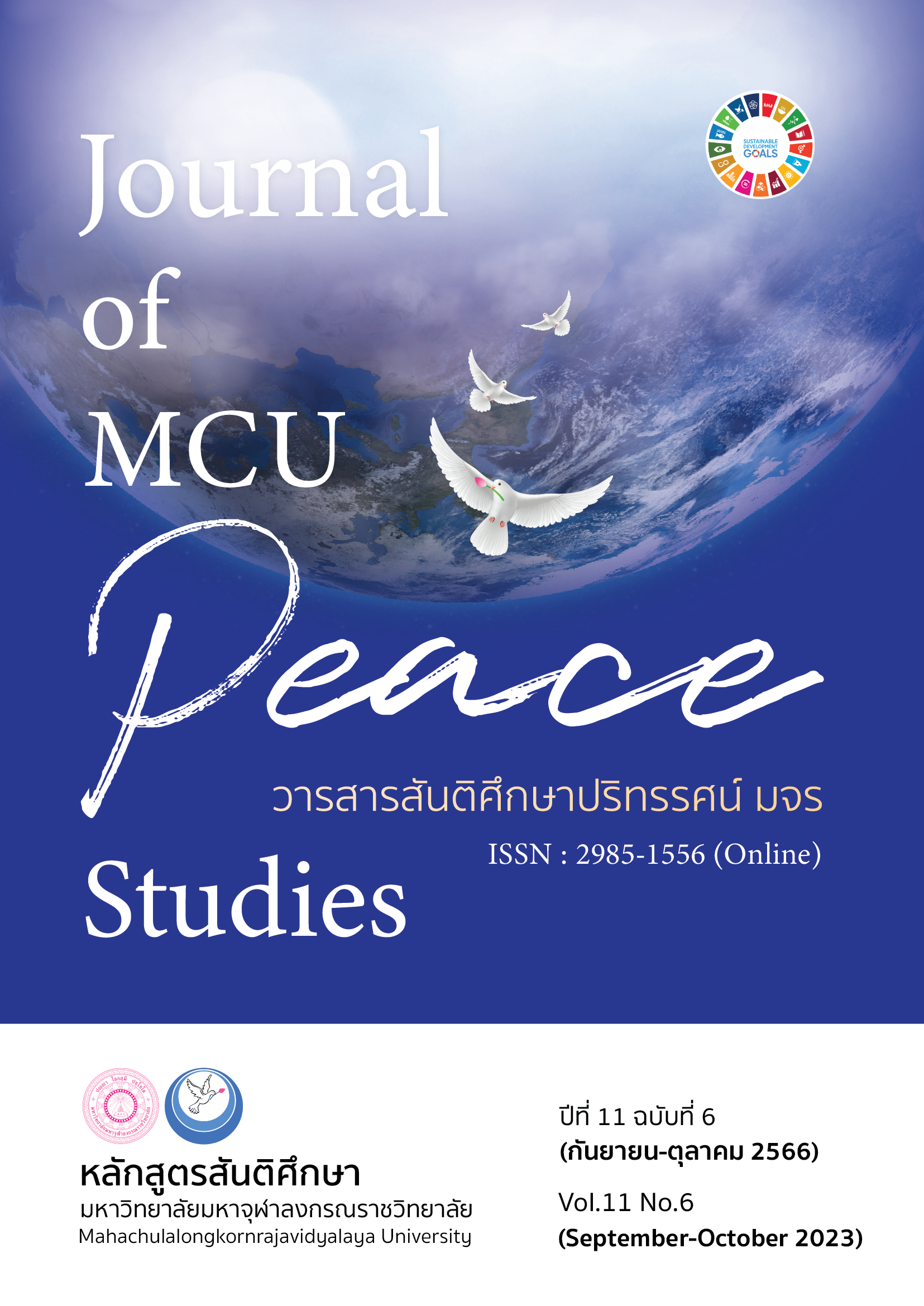การพัฒนาความคิดสร้างสรรค์ของนักเรียนชั้นมัธยมศึกษาปีที่ 4 เรื่อง สารละลาย โดยใช้การจัดการเรียนรู้แบบสตีมศึกษา
Main Article Content
บทคัดย่อ
บทความวิจัยนี้มีวัตถุประสงค์เพื่อ 1) สร้างแผนการจัดการเรียนรู้แบบสตีมศึกษา เรื่อง สารละลาย
ให้มีประสิทธิภาพตามเกณฑ์ 80/80 2) เปรียบเทียบความคิดสร้างสรรค์ของนักเรียนก่อนเรียนและหลังเรียน
3) เปรียบเทียบผลสัมฤทธิ์ทางการเรียนของนักเรียนก่อนเรียนและหลังเรียน 4) ศึกษาความพึงพอใจ ของนักเรียนที่มีต่อการจัดการเรียนรู้แบบสตีมศึกษา ใช้รูปแบบการวิจัยเชิงปริมาณ กลุ่มตัวอย่างในการวิจัย คือ นักเรียนชั้นมัธยมศึกษาปีที่ 4/1 ภาคเรียนที่ 2 ปีการศึกษา 2563 โรงเรียนธาตุนารายณ์วิทยา อำเภอเมือง จังหวัดสกลนคร จำนวน 40 คน โดยการสุ่มตัวอย่างแบบกลุ่ม เครื่องมือที่ใช้ ได้แก่ 1) แผนการจัดการเรียนรู้แบบสตีมศึกษา 2) แบบทดสอบวัดความคิดสร้างสรรค์ 3) แบบทดสอบวัดผลสัมฤทธิ์ทางการเรียน 4) แบบสอบถามความพึงพอใจ สถิติที่ใช้ในการวิเคราะห์ข้อมูล ได้แก่ ค่าร้อยละ ค่าเฉลี่ย ค่าเบี่ยงเบนมาตรฐาน และสถิติทดสอบค่าทีแบบกลุ่มที่ไม่เป็นอิสระต่อกัน
ผลการวิจัยพบว่า 1) แผนการจัดการเรียนรู้แบบสตีมศึกษา เรื่อง สารละลาย มีประสิทธิภาพเท่ากับ 80.98/80.11 ซึ่งเป็นไปตามเกณฑ์ 80/80 ที่กำหนดไว้ 2) ความคิดสร้างสรรค์ของนักเรียนหลังเรียนสูงกว่าก่อนเรียน อย่างมีนัยสำคัญทางสถิติที่ระดับ .01 3) ผลสัมฤทธิ์ทางการเรียนของนักเรียนหลังเรียนสูงกว่า ก่อนเรียนอย่างมีนัยสำคัญทางสถิติที่ระดับ .01 4) ความพึงพอใจของนักเรียนต่อการจัดการเรียนรู้ แบบสตีมศึกษา อยู่ในระดับมากที่สุด (= 4.57, S.D. = 0.61)
Article Details

อนุญาตภายใต้เงื่อนไข Creative Commons Attribution-NonCommercial-NoDerivatives 4.0 International License.
ทัศนะและความคิดเห็นที่ปรากฏในบทความในวารสาร ถือเป็นความรับผิดชอบของผู้เขียนบทความนั้น และไม่ถือเป็นทัศนะและความรับผิดชอบของกองบรรณาธิการ ยินยอมว่าบทความเป็นลิขสิทธิ์ของวารสาร
เอกสารอ้างอิง
Benchapich, P., & Pariput, P. (2020). The Development of Early Childhood Children’s Problem- solving Ability Through Learning Activity Package Based on STEAM Education. Journal of Roi Et Rajabhat University, 14(2), 90-99.
Chung, S. K., & Li, D. (2021). Issues-based STEAM Education: A Case Study in a Hong Kong Secondary School. International Journal of Education & the Arts, 22(3), 1-22.
Conradty, C., Sotiriou, A. S., & Bogner, F. X. (2020). How Creativity in STEAM Modules Intervenes with Self-efficacy and Motivation. Education Sciences, 10(3), 1-15.
Intavimolsri, S., Kaewdee, S., & Pattaradilokrat, S. (2019). Effects of Using the STEAM Education Approach in Biology on Scientific Creativity and Learning Achievement of Tenth Grade Students. Journal of Education Studies, 47(2), 410-429.
Issanapong, S., Chaiprasert, P., & Singlop, S. (2021). STEAM Education Approach on Learning Achievement, Scientific Creativity and Attitude toward Chemistry for Grade 10 Students. MBU Education Journal, 9(2), 37-47.
Jampong, M., & Prammanee, N. (2017). Development of Training Package for Work Creation Through Steam Education Approach on Energy around Us. EAU Heritage Journal Social Sciences of Humanity, 7(3), 81-92.
Jituafua, A. (2020). The Development of STEAM Education Integrated Learning Unit Combined with Philosophy of Sufficiency Economy for Grade 4–6 Students. Journal of Research Unit on Science, Technology and Environment for Learning, 11(2), 252-267.
Khamhaengpol, A., Sriprom, M., & Chuamchaitrakool, P. (2021). Development of STEAM Activity on Nanotechnology to Determine Basic Science Process Skills and Engineering Design Process for High School Students. Thinking Skills and Creativity, 39(4), 1-7.
Ministry of Education. (2008). The Basic Education Core Curriculum A.D. 2008. Bangkok: Ministry of Education.
National Institute of Educational Testing Service. (2019). Summary of the Results of the Basic National Educational Test (O-NET) Academic Year 2019. Bangkok: Ministry of Education.
National PISA Operation Center, Institute for the Promotion of Teaching Science and Technology. (2021). Preparation for International Standard Student Competency Assessment Year 2021. Bangkok: Ministry of Education.
Panich, V. (2015). Ways to Create Learning for Students in the 21st Century. Journal of Learning Innovations Walailak University, 1(2), 1-14.
Rasmimariya, K. (2016). A Development of Scientific Experiment Packages on Substance and Properties of Substances for Mathayomsuksa 4 Students of Patumwan Demonstration School. Srinakharinwirot Research and Development (Journal of Humanities and Social Sciences), 8(16), 125-135.
Saksriwan, D., & Pongern, W. (2020). The Development of Art Activities Based on STEAM with the Local Learning Resources to Promote the Creative Works of Third Grade Students. Silpakorn Educational Research Journal, 12(2), 53-70.
Sattrapruek, S. (2017). Flipped Classroom in 21st Century Learning for Development of Learning and Innovation Skills. Academic Services Journal, Prince of Songkla University, 28(1), 100-108.
Sriboon, S., & Pongen, W. (2019). The Learning Outcomes of STEAM Education Based on Problem Based Learning to Developing Mathematical Skills and Process for Seventh Grade Students. Journal of Education Studies, 47(1), 526-547.
Subcharoen, P., Tungkunanan, P., & Kantathanawat, T. (2020). The Effect of Learning Management Plan with E-learning Based on STEAM Education on 10th Grade in Project Development of Technology 1 Subject (Computing Science). Journal of Industrial Education, 19(2), 90-99.
Tayea, F., Mophan, N., & Waedrama, M. (2017). Effect of STEAM Education on Science Learning Achievement, Creative Thinking and Satisfaction of Grade 5 Students towards the Learning Management. Princess of Naradhiwas University Journal of Humanities and Social Sciences, 4(2), 1-14.
Thammayod, A., Khamhaengpol, A., & Pansuppawat T. (2021). Development of Creative Thinking of Mathayomsuksa 2 Students on the Topic of Separation of Substances Using STEAM Education Combined with the Philosophy of Sufficiency Economy. Journal of MCU Peace Studies, 10(1), 142-159.
Wongthong, P. (2020). Integrated Steam Education Teaching Practice for Improving Critical Thinking and Problem-solving Abilities of First Grade Students in Small Primary School. Journal of Education Khon Kaen University, 1(10), 94-110.


